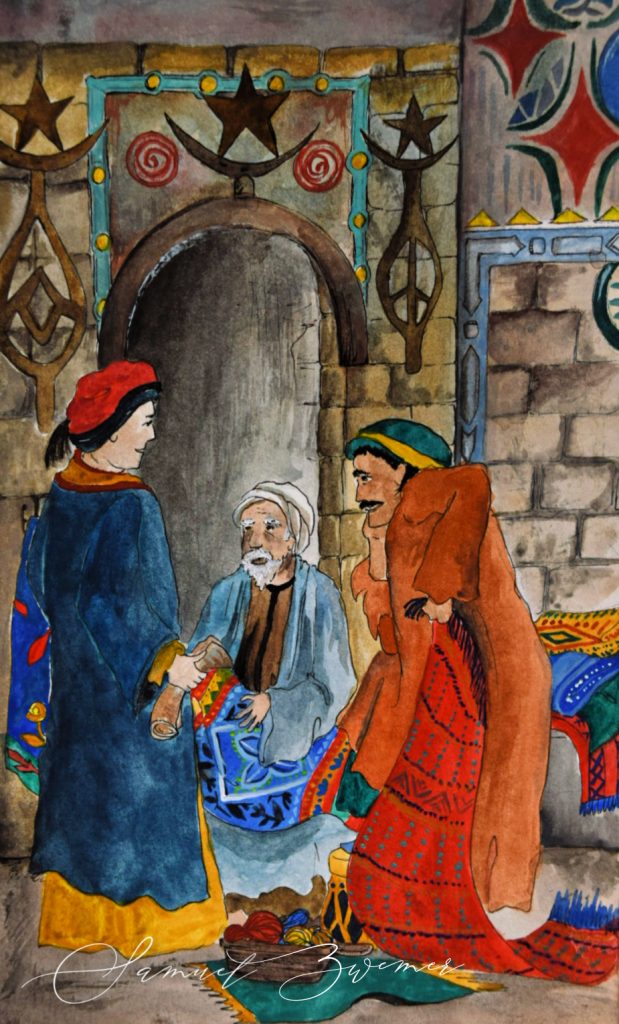Samuel Marinus Zwemer was born on April 12, 1867 in the town of Vriesland, Michigan. He was the thirteenth child of the Dutch reformed minister’s large and happy family. When Samuel was born, his mother placed him in the cradle with the prayer that when he grew up, he would be a missionary to foreign lands.
Each year, the Zwemer family went through the entire Bible by reading it together at every meal. God blessed his parents’ faithfulness and Samuel put his faith in Christ as his Savior at a very young age.
When he attended a missions meeting during his school years, Samuel was struck by the amount of people who died having never heard the gospel. That very day, he pledged to go overseas as a missionary. Before ever reaching the mission field, Samuel endeavored to be a faithful laborer right where he was. While in Theological seminary, he did all he could for the poor in the slums, sharing the gospel and also helping them get needed medical attention.
In his first year at school, Samuel set aside a special time from 12:00 noon to 1:00 pm for reading the word and prayer. Later, he would read the scripture in a different language every day to help him prepare. Aside from studies, Samuel acquired medical knowledge through reading books on Anatomy and becoming assistant pharmacist to retired missionary physician and surgeon, Dr. Wanless.
Zwemer was six feet and slim with a ready smile and eyes that sparkled with fun. One day at seminary Samuel said to a fellow student and dear friend, James Cantine, “You know, you and I ought to get something underway. We should offer ourselves to some needy field and maybe start a new work.”
“That’s just what I’ve been thinking!” James replied enthusiastically. The young men immediately shook hands and constantly prayed over whatever this new work would be, and for the strength to do it. As they started to make plans, Zwemer and Cantine chose Arabia, the homeland of Islam as the most difficult field they could find.
Both men approached several societies about sending them as missionaries to Arabia, but no one would send them. Missionaries who were willing to go to the Muslim world were very scarce in those days. So Samuel and James raised funds for each other at various churches and congregations. This was the start of the Arabian Mission.
Following James, who had gone the year before, Samuel graduated from college and began his journey east in June, 1890. When he finally reached Arabia, Samuel and James studied the language with national teachers in Beirut. After some months of traveling around the Arabic countries, Samuel and James opened up a shop selling Scriptures in the bazaar in Basra. Soon, they experienced opposition and open hostility from the Turkish authorities. The shop was closed and the mission house guarded by soldiers for a time.
Always on the move, Samuel opened a work on the island of Bahrain in 1892.
On May 18, 1896, Samuel fell in love with and married Amy Wilkes, a new missionary and nurse he and James had welcomed at the harbor. Samuel and Amy had two surviving children, Raymond and Elizabeth.
The first two books Samuel wrote were Arabia: the Cradle of Islam and Raymond Lull, First Missionary to Moslems. In his life, Samuel would write over 50 volumes on Islam and the Arabic world.
When he and Amy returned to America on furlough in 1905, he was asked to speak at many mission conferences. At one, Samuel hung a map of the Moslem world before the congregation and said with a sweep of his hand, “’Thou O Christ art all I want and Thou O Christ art all they want. What Christ can do for any man, He can do for every man.’ ” His heart was to compel his placid fellow Christians to pour their lives out in calling men to Christ.
Samuel was eager to get back to the Lord’s work in Arabia and a door was opened for him and his family to move to Cairo in 1912. At the time, Cairo was the center of Islamic thought and the gateway to Islam for many African countries.
Samuel earned the nickname of, “a steam engine in breeches,” because of his fast paced and full traveling schedule. He travelled through much of North Africa holding conferences in Algiers, Tunis, Sousse and Morocco. Samuel and Amy were also invited to minister briefly in Indonesia, Baghdad, Iran, India and China. Because of his knowledge of Arabic and Islam, Samuel was even invited to speak at mosques. Wherever Muslims could be found, there Zwemer would go.
When he spoke at a convention in Keswick, England, Samuel related Peter’s words in Luke 5:5 to the Muslim world. “Master, we have toiled all night, and have taken nothing: nevertheless at Thy word, I will let down the net.” Zwemer spoke with power, “By faith as we obey our Lord’s commission, the time will come when Muslims will be brought to Christ in such numbers that the boats, or churches will not be able to hold them.” This sparked a prayer ministry for the Arab lands in England.
After more than forty years of marriage, Samuel’s beloved wife and constant companion died suddenly. 71 year old Samuel suffered from extreme loneliness, but married again three years later to a retired secretary, Margaret Clarke.
At this time, Zwemer was living in New York City training missionaries and teaching at the seminary. He called this ‘active service.’ In 1949 he and Margaret sailed to the Arabian coast to observe the 60th anniversary for the mission he had founded. After visiting the graves of missionaries and their children in Bahrain, Samuel said with tears in his eyes, “If we should hold our peace, these very stones would cry out for evangelization of Arabia!”
The next year Margaret became ill and died in a New York hospital. On April 2, 1952, Samuel Zwemer, while recovering from a heart attack, ceased to breathe and passed into eternity at 85 years old. Up to his last day, Samuel Zwemer never lost his humor and compassion. By the end of his life, Zwemer knew of only 2 converted Muslims. In man’s eyes he may look like a failure, but in God’s he was a faithful witness to the unbelieving all his days, to the glory of His matchless Name.
At the memorial service, he was called, “Prince among missionaries and an apostle to muslims.” At another service remembering Zwemer’s life of sacrifice for the Muslims, the speaker called out to the people, “The doors are opening, but who will enter them? The walls are falling, but who will occupy the city? The fields are becoming white for harvest, but the laborers are few!”
WILL YOU GO?
“The great Pioneer Missionaries all had ‘inverted homesickness’, this passion to call that country their home which was most in need of the Gospel. In this passion all other passions died; before this vision all other visions faded; this call drowned all other voices. They were the pioneers of the Kingdom, the forelopers of God, eager to cross the border-marches and discover new lands or win new-empires.”



